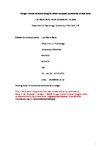Hunger-related intrusive thoughts reflect increased accessibility of food items
| dc.contributor.author | Berry, LM | |
| dc.contributor.author | Andrade, J | |
| dc.contributor.author | May, J | |
| dc.date.accessioned | 2012-05-18T15:34:36Z | |
| dc.date.available | 2012-05-18T15:34:36Z | |
| dc.date.issued | 2007-01-01 | |
| dc.identifier.issn | 0269-9931 | |
| dc.identifier.issn | 1464-0600 | |
| dc.identifier.uri | http://hdl.handle.net/10026.1/998 | |
| dc.description.abstract |
The elaborated intrusion model (Kavanagh, Andrade, & May, 2005) argues that a craving episode begins with a desire-related intrusive thought. This study tests the assumption that such intrusive thoughts, during hunger, reflect an increase in accessibility of food-related information in memory. Fifty-six undergraduates were randomly assigned to hungry or satiated conditions. Hunger was manipulated by asking the "hungry" group to abstain from eating breakfast and snacks prior to testing before lunch, while the "satiated" group was asked to eat normally and attend testing after lunch. Participants completed a lexical decision task containing food-related and neutral words, an intrusive thoughts questionnaire and a hunger questionnaire. Priming for food-related items relative to neutral on the lexical decision task was higher for hungry participants than satiated participants. Priming correlated strongly with frequency of food-related intrusive thoughts during the task. We conclude that desire-related lexical decision priming could provide a useful objective correlate of proneness to desire-related intrusions. | |
| dc.format.extent | 865-878 | |
| dc.language | en | |
| dc.language.iso | en | |
| dc.publisher | Informa UK Limited | |
| dc.subject | 5202 Biological Psychology | |
| dc.subject | 52 Psychology | |
| dc.subject | Clinical Research | |
| dc.subject | Nutrition | |
| dc.title | Hunger-related intrusive thoughts reflect increased accessibility of food items | |
| dc.type | journal-article | |
| dc.type | Article | |
| plymouth.author-url | https://www.webofscience.com/api/gateway?GWVersion=2&SrcApp=PARTNER_APP&SrcAuth=LinksAMR&KeyUT=WOS:000248080900009&DestLinkType=FullRecord&DestApp=ALL_WOS&UsrCustomerID=11bb513d99f797142bcfeffcc58ea008 | |
| plymouth.issue | 4 | |
| plymouth.volume | 21 | |
| plymouth.publication-status | Published | |
| plymouth.journal | Cognition & Emotion | |
| dc.identifier.doi | 10.1080/02699930600826408 | |
| plymouth.organisational-group | /Plymouth | |
| plymouth.organisational-group | /Plymouth/Admin Group - REF | |
| plymouth.organisational-group | /Plymouth/Admin Group - REF/REF Admin Group - FoH | |
| plymouth.organisational-group | /Plymouth/Faculty of Health | |
| plymouth.organisational-group | /Plymouth/Faculty of Health/School of Psychology | |
| plymouth.organisational-group | /Plymouth/REF 2021 Researchers by UoA | |
| plymouth.organisational-group | /Plymouth/REF 2021 Researchers by UoA/UoA04 Psychology, Psychiatry and Neuroscience | |
| plymouth.organisational-group | /Plymouth/REF 2021 Researchers by UoA/UoA04 Psychology, Psychiatry and Neuroscience/UoA04 REF peer reviewers | |
| plymouth.organisational-group | /Plymouth/Research Groups | |
| plymouth.organisational-group | /Plymouth/Research Groups/Centre for Brain, Cognition and Behaviour (CBCB) | |
| plymouth.organisational-group | /Plymouth/Research Groups/Centre for Brain, Cognition and Behaviour (CBCB)/Behaviour | |
| plymouth.organisational-group | /Plymouth/Research Groups/Centre for Brain, Cognition and Behaviour (CBCB)/Cognition | |
| plymouth.organisational-group | /Plymouth/Research Groups/Institute of Health and Community | |
| plymouth.organisational-group | /Plymouth/Research Groups/Plymouth Institute of Health and Care Research (PIHR) | |
| plymouth.organisational-group | /Plymouth/Users by role | |
| plymouth.organisational-group | /Plymouth/Users by role/Academics | |
| dc.identifier.eissn | 1464-0600 | |
| dc.rights.embargoperiod | Not known | |
| rioxxterms.versionofrecord | 10.1080/02699930600826408 | |
| rioxxterms.licenseref.uri | http://www.rioxx.net/licenses/all-rights-reserved | |
| rioxxterms.type | Journal Article/Review |


